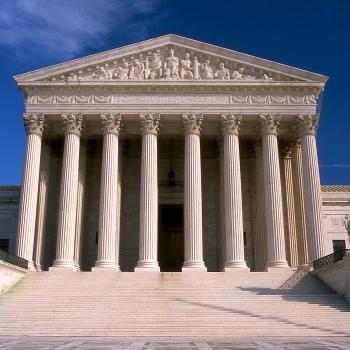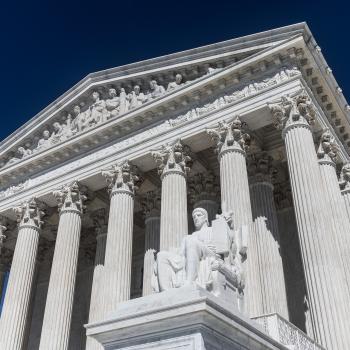This week, Cooper heads into D.C. to meet with Randall Wasson of the Washington Star. Several readers have asked why Randall doesn’t meet with Cooper somewhere other than his office, if he doesn’t want anyone to see him with Cooper. I’m not sure, but Randall did tell Cooper that the Star offices would be empty at 8am, because of the publishing schedule, and no one would see them.
Personally, I’m wondering why Farris gave us characters named Randall and Randolph, in the same book.
Cooper is driving to the Star office.
He clicked the radio on to WTOP, the all-news channel. it was a mild distraction until he heard Suskins’ voice on the radio. He had watched all the clips of the news he could stand. Listening to another story on the radio was out of the question. He hit the button for the Christian station. Preaching. Not now. He hit the switch for his aunt’s favorite oldies station. Love gone bad. He told to car to just shut up and drive.
Cooper’s mind is full. He keeps rerunning his arguments at the hearing, and he cries out at God for not making sure he knew about Laura’s engagement before the hearing. Cooper has a lot on his mind—and that’s understandable. This isn’t:
Cooper closed his eyes for a split second and then sighed heavily.
Don’t crash your car, Cooper.
Cooper realizes that he’s mad at God—not at Suskins or at the voters. He feels that it’s all “God’s fault” because God could have “overridden” the voters but he didn’t. God, he concluded, had abandoned both him (i.e. Cooper) and America. “You’ve got to help me, God,” he prays. “I can’t carry this alone.” Since this is a Farris novel, we all know Cooper won’t be this jaded long.
After engaging in some small talk—mostly about coffee—Cooper and Randall sit down to talk.
Wasson was about five feet six, with salt-and-pepper hair and a trim beard. He wore a black cashmere camel hair sports jacket, grey tweed pants, a button-down oxford white shirt, and a dark red tie patterned with charcoal-colored diamonds. His demeanor seemed energetic and friendly, not rushed.
I’m finding it odd that Randall gets last-name treatment given that, as we’re about to find out, he’s one of the good guys. Are we meant to take it as a sign that he may ultimately be more complicated?
Randall asks Cooper what he thought of the Star‘s coverage of the hearing.
“It wasn’t bad. In fact, it was probably one of the better articles your paper has done on the case,” Cooper replied, as he sank down in one of the saddle-colored stuffed leather chairs.
“That’s (sic) sounds like you haven’t been particularly pleased with our coverage up until this point.”
“Well,” Cooper said, wanting to be diplomatically truthful, “I haven’t felt that the Star was the most favorable paper on the issue. In fact, the editorials have been harsh at times.”
“Harsh? I wouldn’t call them harsh,” Wasson replied. “‘Disgusting’ is the word I would use.”
“Disgusting?” Cooper replied incredulously. “Why would you say that about your own paper?”
“Ah, Mr. Stone, as you are about to learn, I may own a piece of the Washington Star, but I am not enamored with our positioning. Its editorial stance leans too far to the left for my taste.”
Randall explains that the Wassons had run the Washington Star for three generations, and that his parents expected him and his brother to do the same, following in their footsteps and mold, but that while at Princeton he “managed to fall in with some bad company from my family’s perspective.”
“A friend of mine was part of Campus Crusade for Christ, and next thing any of them knew, their son who had been raised in a strong secularist tradition was suddenly a born-again Christian.”
“Wow,” Cooper replied. “And I take it your family was not too pleased.”
“Exactly. Oh, they put a brave face on it. And they tried their best to find ways to dissuade me from using the family fortune to advance opinions they find tone anathema, but they have not been particularly successful in keeping me out of the family business altogether. For reasons that no one seems to understand, including me, I have been pretty successful in giving advice and direction to a variety of ventures and have been more or less tolerated for my religious views because they like the money they think I bring in.”
Randall tells Cooper that “God has chosen to bless me in giving me good ideas and a clear head, so that there is a witness to my family,” and that “God has used me as a life lesson to my family to demonstrate that he is a rewarder of those who diligently seek him.” That must be sure comfort to Christians who live in poverty or otherwise struggle to make ends meet.
Cooper tells Randall that his is “one of the most interesting stories I have heard in years,” and all I can think is, Randall’s story is a dime a dozen. Conservative evangelical Christianity is replete with wealthy businessmen who use their money to advance conservative causes.
Randall says he would like to give up to $250,000 to the case, but only if no one knows about it. The first check, for $100,000, will have to come from his lawyer in Asheville, and will not have Randall’s name anywhere on it. All further funding will come through the lawyer. If the media learns that Randall is funding the case, he will pull out and end all further funding.
“I am trying my best to gain influence here at the Star on more than just the business end of things. And if I am seen as a conservative ideologue, my brother will do everything he can to exclude me completely. I want to win the battle on a lot of fronts, so it is important to me that I be able to do this anonymously. You can’t tell anybody where the money came from.”
I’m not clear on how the Star is currently being run. Who has editorial control? Or is there another form of control? Are Randall and his brother co-owners, but his brother is still secular (and presumably liberal)?
This whole situation seems odd to me because we live in a world where wealthy conservative businessmen don’t generally feel shy about funding conservative causes—a world where conservative businessmen control large media companies and shape the news for tens of millions of people. The secrecy here—the hiding—feels off. That’s not the world we live in.
It makes me curious—is this a product of the evangelical persecution complex Farris clearly buys into, or is was the world really this different in the early 2000s? Have wealthy conservative businessmen become more bold in the past two decades than they were in the 1990s? I don’t feel fully qualified to answer that question, but I’m more than a little bit skeptical.
Actually, I take that back. I will take a stab at that question. The Cato Institute and the Heritage Foundation were founded in the 1970s. Conservative businessmen have long funded conservative causes. Evangelicals were doing the exact same thing in the 1980s and 1990s (and there was a lot of overlap between the two). This isn’t something new or novel.
Cooper says he’s ethically required to tell his clients who is funding the case. Randall says that’s ok, but that they have to be sworn to secrecy too.
Randall tells Cooper not to thank him:
“It is God’s money, and I just try to follow orders on how to spend it.”
That’s all very pat and everything.
Cooper and Randall pray together (Randall puts his hands on Cooper’s shoulders) before Cooper leaves, his mind much more at ease.
I am annoyed by how the issue of funding is treated in this book. Very annoyed. This case would be funded to the hilt by conservative evangelical legal and activist group from the get-go. The case in Farris’ previous book was at least local, and didn’t appear to have national significance until the very end. That is not the case here. This case is very clearly a test case for the entire treaty, and affects the entire country.
The only reason for having funding be such an iffy proposition that I can think of is Farris’ interest in making this the story of an underdog. Nobody expects anything of Cooper. He’s a small town lawyer! Who’s even going to fund the case? He’s driving a beat-up old car for crying out loud! But look! God is looking out for him! He manages to secure funding, miraculously, and precariously enough that he keeps some tension in the plot.
This is not the world we live in. It’s just not. Conservatives like to think they’re the underdog, but they haven’t been for a long time.
Scene change!
Remember how Peter said he was going to New York City for a conference, and that he was planning to take Gwen with him and to see some Broadway shows with her (edit: they left the kids at home), and asked Cooper to meet them while they were there? Well, we’re there! Cooper meets Peter and Gwen at the Tavern on the Green.
“What have you been doing while Peter has been at his conference?”
“Our youngest is three, Cooper. A mother of a three-year-old sleeps whenever she has a chance.”
“And does just enough shopping to keep New York merchants from becoming destitute,” [Peter added].
I. Um. Ok.
Look, I’ave had a three-year-old, and there’s no way I would have spent a trip to New York City sleeping. Peter’s rejoinder suggests that Gwen’s comment is perhaps meant as a joke—but to what purpose?
And really? Shopping? Not sight seeing? Not checking out an art museum, or whatever else there is to see in New York City? (I suspect I’m letting the fact that I’ve never been to New York City show.) I really dislike how Farris writes women. They’re living stereotypes. Gwen is a mom, and when she has free time she shops, and that’s all we need to know about her.
Boring smaltalk is boring.
Boring recap of the case is boring.
Gwen asks Cooper what the case will mean for her family, and other families, if the treaty remains in place. Cooper offers this answer:
“No home schooling for people like you and me not committed to their ideas of tolerance. No spanking—well, that is gone already. Your children will have the ability to access whatever information they want and parents will be unable to stop them. Our ability to share our faith will be left in shambles. We can teach that Jesus is one way to God, but if we teach that he is the way, the truth, and the life and that no man—or woman, got to be inclusive and tolerant—comes to the Father but by him, we are toast.”
Let’s be clear about something—the article which gives children freedom of importation, Article 13, specifically says this freedom can be limited to protect “public health or morals.” I’ve seen individuals like Farris claim that the U.N. Convention on the Rights of the Child gives children the right to view pornography (which I think is being alluded to here). This is not true.
Cooper expresses his sense of inadequacy.
“James Madison was about your age when he shepherded the Constitution through the convention in Philadelphia,” Gwen said.
Cooper looked at her with raised eyebrows and a smile. “Very impressive, Mrs. Barron.”
Shock, surprise—a woman knew something!
“Home school moms know things like that,” Peter replied, giving his wife an extra hug. “I just bring her along to show off because my lawyer friends don’t know as much about American history, the Constitution, and the law as she does. She really can be the life of the party until she starts lecturing the lawyers on some of her favorite founders.”
“Oh, stop it,” Gwen said, nudging her husband playfully.
Peter looked into Gwen’s eyes just as she did that, and a moment of strong magical emotions passed between them.
Oh my god, can Farris be more patronizing?
I’ll tell you something about homeschool moms—and for reference, we’re talking about the sort of homeschool moms Farris knows—homeschool moms often do know a lot about the American Revolution and the founding fathers, but they just as often known nothing about the civil rights movement.
In this corner of the homeschool world, the American Revolution and the Constitutional Convention looms so large that it consumes all else. And just so we’re clear—what these homeschool moms know about the American Revolution tends to also be selective, and more hagiographical than historical.
But seriously—that interchange between Peter and Gwen—and Peter’s statement that he only brings her along to impress his lawyer friends—seriously, just stop already. It’s patronizing as all get-out.
Ugh, Gwen. You used to be a nurse.
Cooper’s response, of course, is to feel jealous of what Peter has, because he’s single and would prefer to not be.
Things get weird when Cooper heads back to the hotel room he booked for the evening.
He turned the corner and saw a beautiful woman appearing to have trouble with the key but definitely trying to get into his room. He had an instant thought that she was a mirage, but a quick re-examination revealed that she was having trouble getting into the room next door to his. As he walked closer, not only did she look more beautiful in her short, glittering evening dress, but he thought she looked familiar. He suddenly realized that he knew her.
It’s Jody, of course.
Jody says she stays at this hotel often, when in the city with her work with the U.N. Cooper gentlemanly helps her open the door. Jody chides him for calling her “Ambassador Easler.”
“[W]henever we are alone, please just call me Jody.”
A surge of adrenaline sent shivers throughout his body and a knot into his stomach. Her hair was perfect. Her face was gorgeous. And her body, in that dress—he stopped himself at that. The spiritual and legal mess that she represented wasn’t worth it.
The door clicked open on his fourth or fifth try. “Oh, you did it,” she exclaimed, with glee. “I didn’t want to have to traipse down and get a bellman to come up here. Thank you so much.”
She pressed hard up against his body and gave him a quick kiss on the cheek. Suddenly he began to wonder if the spiritual and legal mess that she represented might be worth the risk.
“Would you like to come in for a moment? I mean, if you are alone, that is.”
Oh boy.
Here’s the thing—it’s not actually that hard to say no to this. All you have to do is say no. Just say no and walk away. Farris mentions the spiritual consequences of any dalliance, but the real issue here is that she’s on the opposing side of a lawsuit he’s arguing. Just say no, and walk away.
He doesn’t, of course. Oh, he does say no! But he doesn’t walk away. Instead, he responds to her flirting in turn. She reaches out and touches his cheek. She entreats him to come in, just for a little bit, she’s lonely.
“I can’t stand the idea of another movie in another hotel room all by myself.”
Walk away.
But he doesn’t walk away.
“I’ve got an alternative suggestion,” he said, while every muscle, every tendon in his body seemed to be shaking. “Why don’t we go for a ride in one of those horse-drawn hansom cabs? I have always wanted to do that, but I never had anyone to do it with. I can’t come into your room, Jody—that’s just not me. But come for a ride in the park with.”
That’s right—Cooper invited Jody to go with him on a romantic horse-drawn carriage ride. Of his own volition. When he could have just said “I’m sorry, I have some work to do for a client tonight and need some rest,” and walked away, no harm no foul.
Jody isn’t just on the other side of this lawsuit. She’s an (ambiguously) important ambassador who played a key role in getting the U.N. Convention on the Rights of the Child ratified by the Senate. She’s Cooper’s ideological enemy. And she’s flirting with him and coming onto him. He ought to be asking why. She’s gorgeous, and presumably has the pick of the litter. Why is she so intent on him? He’s the one defending child beating and trying to destroy her life’s work. It doesn’t make sense.
Perhaps Cooper has bought into Farris’s flowery descriptions of him—is it possible that Cooper is so sure of his position as a catch that he doesn’t blink or think twice at Jody throwing herself at him, as odd as it is?
I just can’t with this sub-plot.
Oh and by the way, when they get into the horse-drawn cab Cooper realizes that Jody isn’t wearing a jacket and, out of concern that she might be cold, he offers her his—even though she hadn’t even mentioned being cold.
“Would you like my jacket?” he asked.
“No, Cooper, just put your arm around my shoulders. I would like that a lot better,” she replied, with a voice as sweet as any he had ever heard.
He felt he had no choice.
What in the blazes?
Jody does not hold any position of power over him. Yes, she’s flirting with him, but all he has to do is turn her down and walk away. She’s not his boss. He’s not dependent on her for getting contracts or being cast in a movie. She’s not physically intimidating him or making any threats.
He has a choice.
All he has to do is say “I’m sorry, this was a bad idea, we’re on opposite sides of an important lawsuit and I’d like to keep our relationship professional. I’m going back to my room to turn in for the night, but I’ve already paid for the cab ride, feel free to stay and enjoy the rest of the ride.”
He doesn’t say that.
He put his arm around her …
Cooper!
… and as he did she turned and kissed him passionately.
What—
He didn’t break away …
—ARE YOU—
… at least not until it was too late to prevent the photographer sequestered on the fourth floor from getting at least six good shots of the kiss with his high-tech camera, outfitted with full capability for shots taken in the dark.
Doing?!
So much for him having good sense!
There were no more kisses that evening, but Cooper could hardly sleep knowing who and what was available next door.
God, Cooper! Switch to another hotel if you have to, you’re being paid, you have money now! Stay far away from Jody, you may not know what game she’s playing, but by now it should be clear that she’s playing a game.
And that’s the end of the chapter.
If you learned that your lawyer went on a romantic horse-drawn carriage ride in the dark in New York City with a powerful government official who is on the other side of a very important lawsuit you’re involved in, on your lawyer’s own time (i.e. not as part of the case) and of their own coalition, what would you think? Or perhaps more importantly—what would you do?
Note: I just edited this post to fix several places where I subbed in Peter for Cooper. Oops! But I mean, they’re pretty much the same person, so…
I have a Patreon! Please support my writing!















